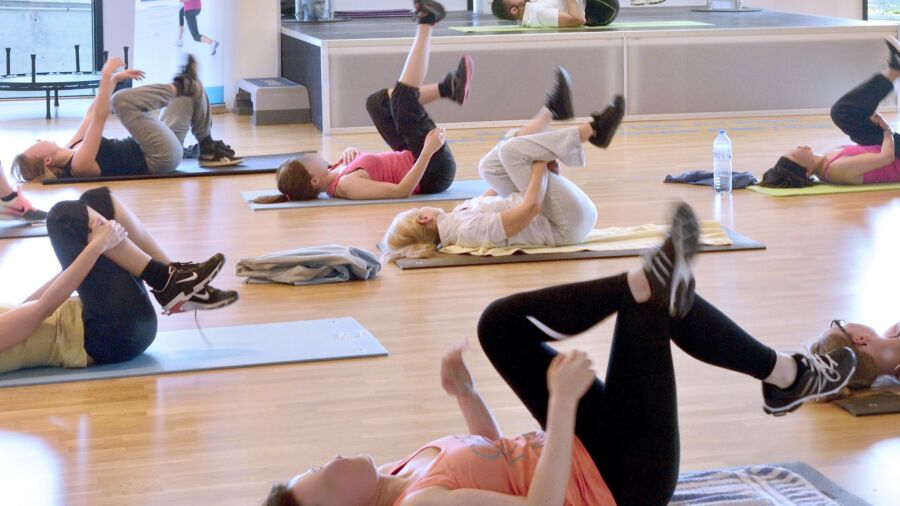New York—An increasing number of sports bra and athletic wear brands have been found with high levels of BPA in them, a chemical compound that’s used to make certain types of plastic and can lead to harmful health effects such as asthma, cardiovascular disease, and obesity, a watchdog group said on Wednesday.
After warning customers in October about BPA in athletic clothes, the Center for Environmental Health (CEH) said it sent legal notices to eight more brands whose leggings, shorts, sports bras, and athletic shirts after testing showed the clothing could expose wearers to up to 40 times the safe limit of BPA, based on standards set in California.
Under California law—specifically Proposition 65, enacted in 1986—the maximum allowable dose level for BPA via skin exposure is 3 micrograms per day.
California-based CEH, which conducted the testing, was founded in 1996 as a nonprofit consumer advocacy group. It has raised alarm bells over chemicals in furniture, carpets, and flooring as well as lead and cadmium in children’s jewelry. It advises universities, companies, and hospitals on potential chemical dangers in products.
The newly tested athletic wear brands and their products include leggings from Athleta, Champion, Kohl’s, Nike, and Patagonia, sports bras from Sweaty Betty, athletic shirts from Fabletics, and shorts from Adidas, Champion, and Nike. CNN has reached out to the companies for comment.
A spokesperson for Athleta said in a statement Wednesday that, “As a certified B-Corp, Athleta is deeply committed to ensuring all our products are made to applicable safety standards. We believe the CEH claims have no merit and stand by our products and practices.”
Previously, the CEH warned consumers in October that sports bras from Athleta, PINK, Asics, The North Face, Brooks, All in Motion, Nike, and FILA that were tested for BPA over a six months period showed the clothing could expose wearers to up to 22 times the safe limit of BPA, based on standards set in California.
The group had also tested athletic shirts in October from brands that included The North Face, Brooks, Mizuno, Athleta, New Balance, and Reebok and found similar results.
The CEH had sent legal notices to the companies last year, giving them 60 days to work with the center to remedy the violations before the group filed a complaint in California state court requiring them to do so. The group said it subsequently initiated lawsuits in February against the companies.
To date, the watchdog said its investigations have found BPA only in polyester-based clothing containing spandex. “We want brands to reformulate their products to remove all bisphenols including BPA. In the interim, we recommend limiting the time you spend in your activewear by changing after your workout,” the group said.
Athleta, Nike, Reebok, The North Face, and Victoria’s Secret (which owns PINK) did not provide a comment to CNN at the time.
BPA (Bisphenol A) is found in a large number of everyday products, from water bottles and canned foods to toys and flooring. In adults, exposure to BPA has been linked to diabetes, heart disease, cancer, obesity, and erectile dysfunction.
Premature death was also associated with BPA exposure, a 2020 study found. More recently, BPA has also been linked to asthma in school-age girls.
“People are exposed to BPA through ingestion, from eating food or drinking water from containers that have leached BPA, or by absorption through the skin,” Kaya Allan Sugerman, CEH’s illegal toxic threats program director, said in a statement.
“Studies have shown that BPA can be absorbed through the skin and end up in the bloodstream after handling receipt paper for seconds or a few minutes at a time. Sports bras and athletic shirts are worn for hours at a time, and you are meant to sweat in them, so it is concerning to be finding such high levels of BPA in our clothing,” Allan Sugerman said.
Over the past year, the group has asked more than 90 companies, including Walgreens and socks and sleepwear brand Hypnotic Hats, to reformulate their products to remove all bisphenols, including BPA. Some have already agreed to do so.
“Even low levels of exposure [to BPA] during pregnancy have been associated with a variety of health problems in offspring,” said Dr. Jimena Díaz Leiva, science director with CEH.
Although CEH litigates under California’s Clean Drinking Water and Toxics Enforcement Act of 1986, it says the repercussions of its settlements extend beyond California “as it is most often economically infeasible for companies to reformulate for just the California market.”
“Our legal action has been successful in pushing entire industries to remove certain chemicals from products like children’s candy or toys,” the group said in a statement to CNN Business in October. “These cases not only serve to protect California consumers but also consumers throughout the country.”
The-CNN-Wire
™ & © 2023 Cable News Network, Inc., a Warner Bros. Discovery Company. All rights reserved.

